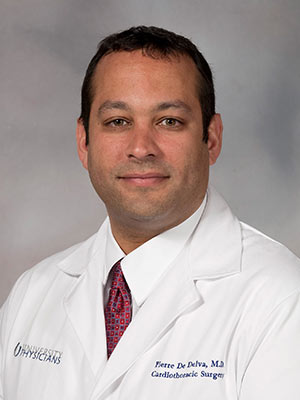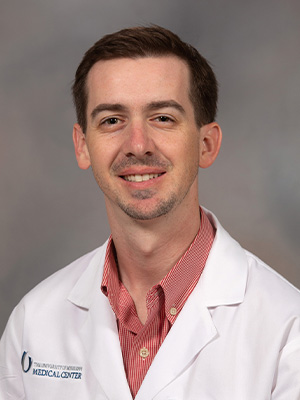Is 2024 your year to stop smoking?
There’s never been a better time to empty your ashtray for good.
If you’ve resolved this year to give up tobacco, know that plenty of help is out there; and, as experts at the University of Mississippi Medical Center will tell you, most people need it to make quitting stick.
As hard as it can be, consider how hard it is on the body to continue: Every year, 5,400 Mississippians lose their lives from tobacco use, reports the Mississippi State Department of Health’s Office of Tobacco Control, and 192,000 children in the state are exposed each year to harmful secondhand smoke.

“Smoking causes lung cancer and other cancers, as well as cardiovascular disease, stroke, respiratory diseases like COPD [chronic obstructive pulmonary disease],” said Dr. Pierre de Delva, professor of surgery-cardiothoracic and director of the Cancer Center and Research Institute’s thoracic cancer program at UMMC.
“Smoking is the single largest risk factor for lung cancer, and of all the deaths attributable to cancer, lung cancer is the biggest cause.
“But smoking affects the entire body, particularly as people age. We know that it is the single largest cause of preventable deaths in the world.”
A key word in that last sentence is “preventable.” No matter how old you are, no matter how long you’ve been smoking, you can still add years to your life by subtracting tobacco from it, de Delva said.
“Even if you decide to quit at 50, your chance for living to 80 is much higher. It’s a benefit that continues as you get older.”
When patients ask de Delva where to start stopping, he refers them to the ACT Center for Tobacco Treatment, Education and Research at UMMC. Located in the Jackson Medical Mall, it provides free help to Mississippians who want to stop using tobacco.
Potentially, that’s a lot of Mississippians. Tied with Kentucky, this state has the fourth-highest percentage of adult smokers among the 49 states and Washington D.C., declares the 2023 Tobacco Report (The Health and Economic Burden of Tobacco on Mississippi) from the Mississippi State University Social Science Research Center. That’s more than 19 percent of all adults.
In 2020, adults in Mississippi smoked 54.5 packs of cigarettes, about 20 more than the national average.
If any are ready to stop, they have at least one more free option: the Mississippi State Department of Health’s Tobacco Quitline, which offers help online or by phone, as well as follow-up support.

For its part, the ACT Center has seen more than 30,000 people since it opened in 1999, said Dr. Jonathan Hontzas, director of the ACT Center and Lung Cancer Screening Services.
In calendar year 2023, the center recorded 3,100 visits and saw 750 new patients. “For those who completed treatment, the quit rate was 59 percent,” said Hontzas, a Doctor of Nursing Practice. “Completed treatment,” means a patient made a least four visits, preferably six.
A successful quitter is defined as someone who has not used tobacco in at least the past six months, Hontzas said. Toward that end, the ACT Center offers nicotine replacement therapy, along with guidance on coping, dealing with stress and ways to help extinguish the fires of tobacco cravings.
“When people try to stop on their own, it’s incredibly difficult,” de Delva said. “Nicotine is very addictive.”
Occurring naturally in tobacco, nicotine is “thought to be as addictive as heroin or cocaine,” the American Cancer Society reports.
Vaping is another concern, de Delva said. A study by the Centers for Disease Control and Prevention found that most e-cigarettes, or vapes, contain nicotine; some product labels either don’t disclose this or make false claims of 0 percent nicotine levels.
More than 22,000 Mississippi public high school students had used e-cigarettes on at least one of the past 30 days in 2021, states the 2023 Tobacco Report.
“People are often young when they start vaping,” de Delva said. “With vaping, significant carcinogens are present, and the earlier you start and the longer you smoke, the higher your risk for disease.”
And the harder it is to quit.
“There are people who say, ‘I can quit on my own’ and have tried,” Hontzas said. “But I’ve been seeing them since 2017.
“When people say they want to quit, we try to determine where they are on a scale of 1 to 10: ‘Are you a 2 or an 8? What’s keeping you from being at the top, a 10? What are the barriers and how can we help you overcome them?’
“Stress, anxiety and so forth are major reasons they may not be completely ready.”
At the ACT Center, three tobacco treatment specialists, all master’s-level licensed counselors are on hand, Hontzas said. The center offers, for free and for up to three months, tobacco cessation medications such as nicotine patches and lozenges.
Prescription medications are also available – but not for free, unless insurance covers everything – such as Wellbutrin (bupropion) and Chantix (varenicline).
After first talking to a counselor and receiving medication therapy, the next step is to pick the Q-Day. A “slow quit,” is not necessarily discouraged, Hontzas said, but setting a firm quit date is “the most effective way.”
To make it even more effective, the ACT Center and other expert sources offer these tips as well:
- Make it hard to get to your cigarettes; banish them from your smoking place – away from your bedside table, for instance, and perhaps in a garage or storage shed instead.
- Smoke less and less every day; remove a set number of cigarettes from your pack daily. What’s left is what you get.
- List the reasons you’re quitting. Improved health may be one. There are also financial incentives. The cost of a pack of cigarettes varies from state to state and from vendor to vendor; but say you smoke a pack a day, at $7 per pack: That’s like taking the end of a lit cigarette to 2,555 dollar bills.
- Let others know that you are quitting, especially friends and family. “A good support system is absolutely important,” Hontzas said.
Physicians are also there to help, de Delva said. “It should be part of every physician’s practice to take a patient’s smoking history, as well as to get them into a program to help them quit.
“Also, in medicine, there has been a big push to reduce the stigma associated with tobacco use. Studies have shown that if a patient comes to the clinic and has the feeling they are being judged, it affects success rates for quitting and completion to treatment.
“That stigma can even prevent people from seeking care. For example, don’t call someone ‘a smoker.’ Instead, say ‘a person who smokes.’
“We recognize that smoking is very challenging and that, with help, you can stop.”
And, if you think you’re ready, don’t hesitate, Hontzas said. “When that door cracks, contact us right away. Take advantage of this opportunity. Don’t wait until the door has closed.”
— — —
If you’re ready to quit smoking, contact the ACT Center at 601-815-1180 or go online; or call the Tobacco Quitline at 1-800-784-8669, or go online at Quitnow.
The above article appears in CONSULT, UMMC’s monthly e-newsletter sharing news about cutting-edge clinical and health science education advances and innovative biomedical research at the Medical Center and giving you tips and suggestions on how you and the people you love can live a healthier life. Click here and enter your email address to receive CONSULT free of charge. You may cancel at any time.



